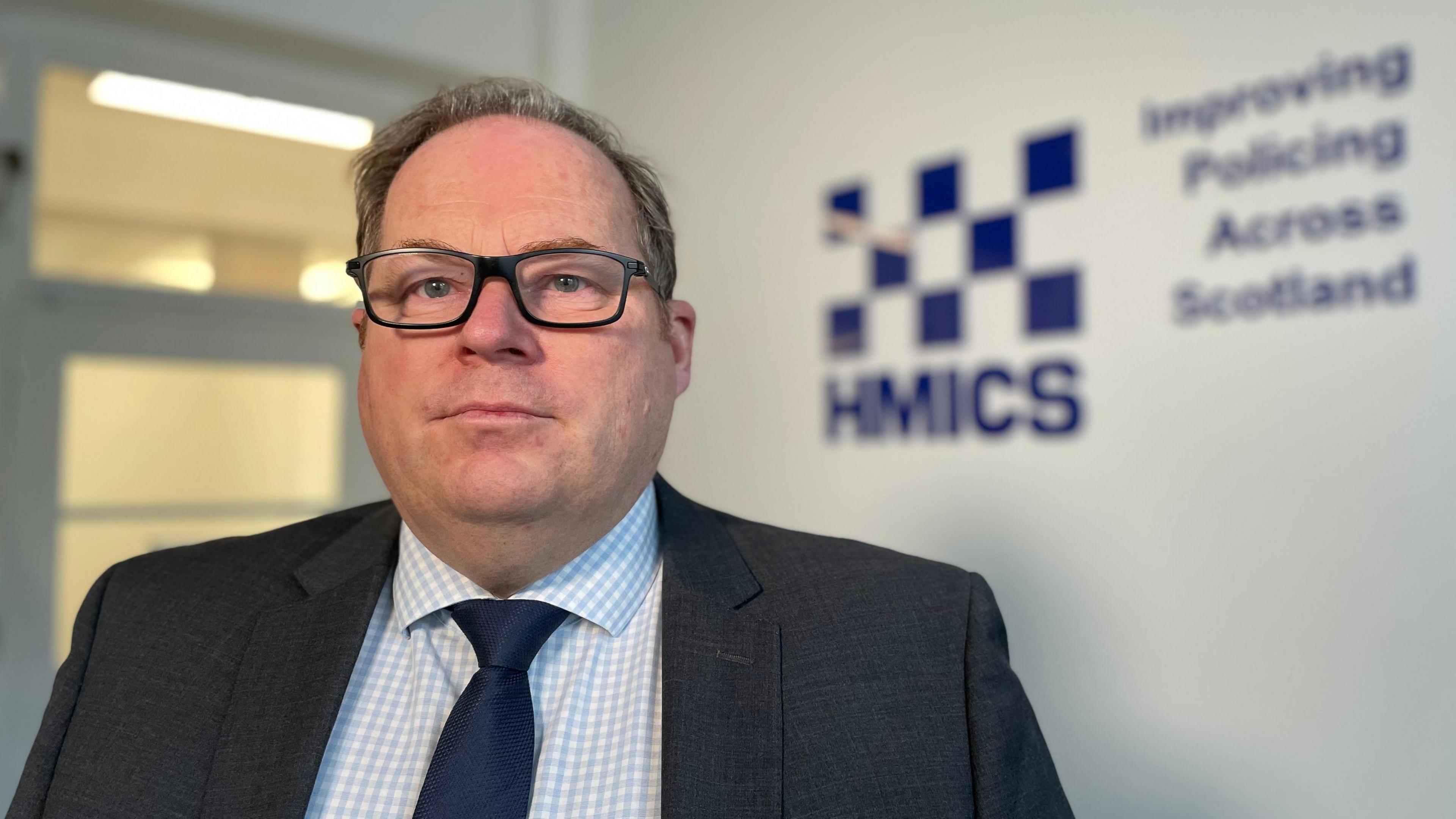Police feel 'vulnerable' due to staffing - watchdog

- Published
Many frontline police officers say current staffing levels in their areas are making them feel vulnerable and - at times - unsafe, the force's watchdog has said.
HM Inspectorate of Constabulary in Scotland (HMICS) reviewed Police Scotland's wellbeing provision and found staffing levels were a prominent concern for officers.
The inspector said that the service was good at supporting officers at points of crisis but failed to recognise the problems that had the biggest impact.
These included low officer numbers, the disruption of rest days and the poor state of many of the busiest police buildings.
Chief Inspector of Constabulary Craig Naylor said none of those causes of stress was recognised in the force's work on wellbeing.
Mr Naylor said: "It tended to be those offices and stations where frontline officers and staff work, that inspectors have noted the worst conditions."
He contrasted the recently remodelled modern building which houses Police Scotland's HR and wellbeing team - complete with taps dispensing sparkling water - with the room set aside for officer wellbeing at Rothesay Police station on Bute, where wallpaper was peeling off the walls because of water coming through the roof.

Chief Inspector of Constabulary Craig Naylor said it was essential officers and staff were looked after
Mr Naylor said: "Police officers and staff support communities during their times of need, witnessing trauma, distress and acts of violence on a daily basis.
"They are exposed to incidents and experiences that most people will not see in their lifetime, and they do this willingly - often running towards danger as others run away.
"It is essential that officers and staff are looked after before - and if - they become unwell, so they can continue to deliver this service to the people of Scotland."
He said the increase in demand on the force was "glowing white hot".
'Over-worked'
The report has been welcomed by the Scottish Police Federation, which represents officers up to the rank of chief inspector.
Its chairman David Threadgold said not a word of it came as a surprise.
"We are over-worked, under-resourced, we have lost over 1,000 officers in the last year," he said.
"The impact of the training embargo, the continuous demand on policing services, the way we fill a gap for the health service, the hate crime legislation, all of these are having an impact on our ability to deliver policing.”
Mr Threadgold said more officers were going off sick more often.
He said more officers than ever before were leaving the service after just four to six years in post.
"We must hold the Scottish government to account to properly fund policing in this country," he said.
Police Scotland said Chief Constable Jo Farrell had prioritised the health and wellbeing of officers and staff.
It said a £17m investment was funding a new 24/7 employee assistance programme, direct access to occupational health services and a greater focus on mental health.
Deputy Chief Constable Alan Speirs said: “We have restarted officer recruitment and are working with the partners in the criminal justice system and in health to reduce unnecessary demand on our frontline officers and staff.
“Police Scotland inherited an ageing estate with many buildings not fit for modern policing and we are working hard to provide our people with appropriate working conditions.”

Rothesay police station on Bute is one of the buildings in a poor state according to HMICS
Justice Secretary Angela Constance said the Scottish government has invested £1.55bn in policing this financial year, with a 12.5% increase in capital funding.
She told BBC Scotland News: "Police officers do a difficult and demanding job day in day out. At times their work is dangerous and it is important that their well being is supported, and not just after traumatic events."
She said efforts were under way to ease the pressure on the frontline, particularly in relation to calls about mental health, and that a "holistic view" was required.
Ms Constance added that "reducing inappropriate demands on policing" was a priority that required linking up with other emergency services.
She said: "“The reform of Police Scotland is an exemplar of public sector reform, and it’s not unreasonable to expect reforms in other services.
“It’s important for the sake of our communities as well as our frontline staff, that people get the right support from the right service at the right time."
The body which oversees Police Scotland, the Scottish Police Authority, welcomed the report and said it would consider its recommendations.
A spokesperson said the review had identified several areas of good practise along with areas for improvement.